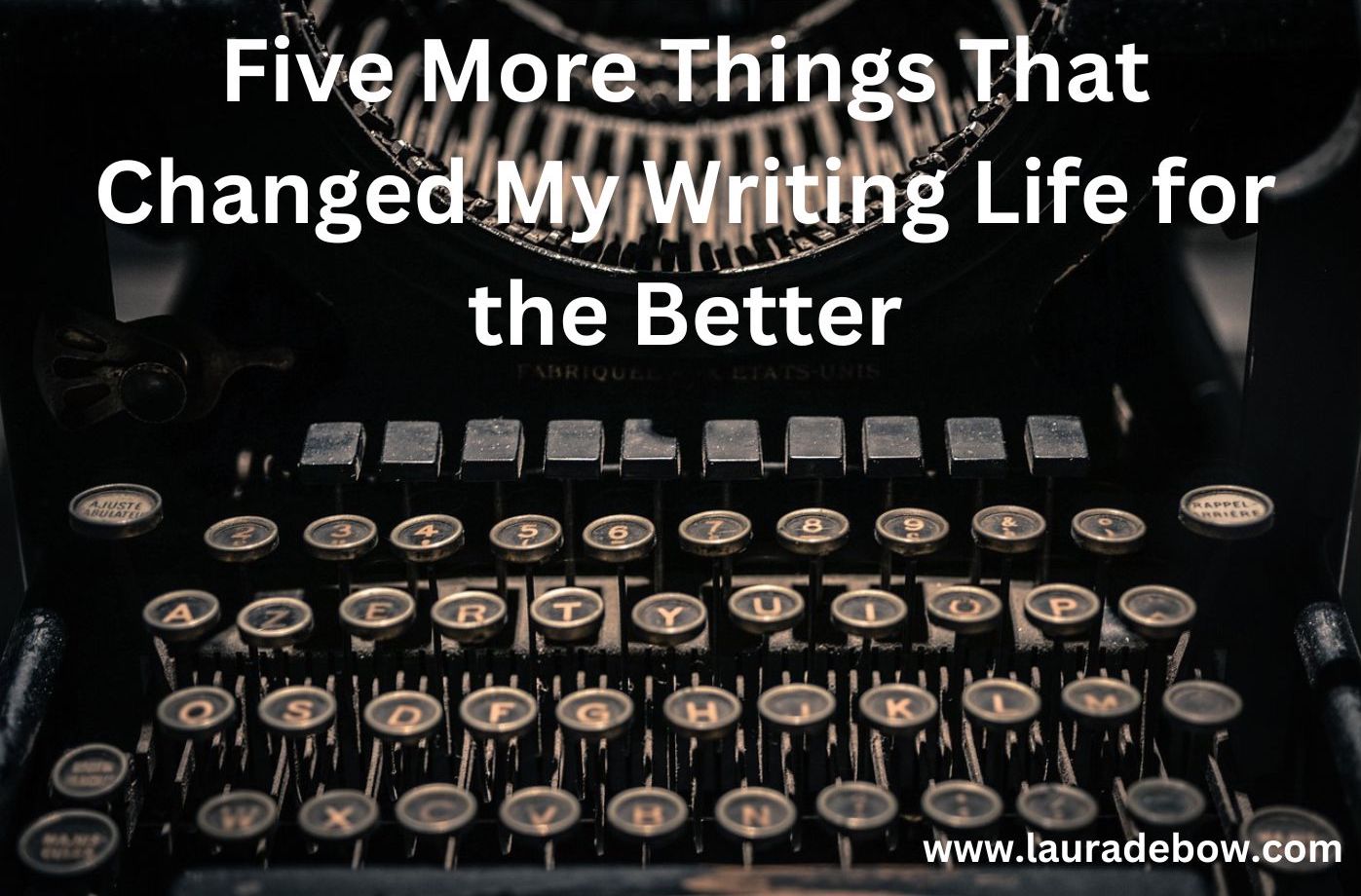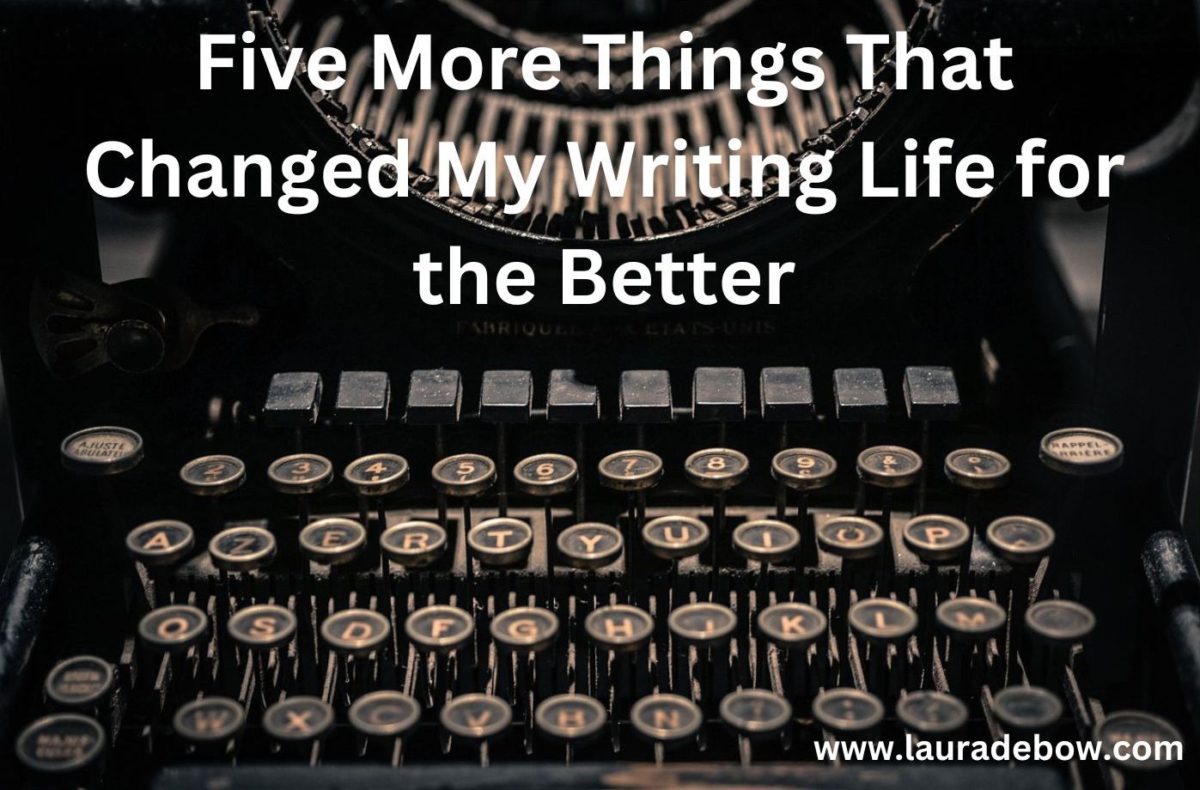
Earlier this spring, I shared five things that changed my writing life for the better. Naturally, there are way more than five things that can help a writer grow and improve. Today, I’m sharing five more practices that are helping me become more disciplined and (hopefully) more successful in writing.
Community/Write-ins
If you poked around my blog at all, you know I’m all about community. Life is so much better when you have others along for the ride, supporting you, calling you out, cheering you on, and such. This is especially true in the writing life. Writing can be a lonely endeavor, as the act of sitting in front of a computer banging out words is a solitary activity. But it doesn’t have to be.
I’ve shared about my amazing writing community many times. One of my absolute favorite things about it is the daily write-ins we have. The same time each weekday morning, I log onto Zoom to chat with my writerly family before we all mute and turn off our cameras and get to work, an hour at a time. The fellowship and accountability with my writer friends encourages me to be on time each session. It’s fun to learn what everyone is working on, how they’re progressing, and to share what’s going on in each other’s lives. The bonus is that the scheduled write-ins offers me an automatic commitment to write each day.
Reading Craft Books
As writers, we’re encouraged to read a lot and write even more. Reading in your own genre helps to learn the conventions editors and publishers (and, not to mention, readers) will expect from your work. But reading about writing—reading craft books—is also greatly beneficial. Not all writing craft books are created equal, but I’ve polled writer friends and researched to cultivate a collection of what I hope will be the best craft books for me.
I love the memoir style of both Stephen King’s On Writing: A Memoir of the Craft and Anne Lamott’s Bird by Bird: Some Instructions on Writing and Life. They’re both enlightening, encouraging, and candid. The more I write, I am able to identify my weak spots, so I know I also I need more practical books on structure, plotting, and voice to push me to write better.
There are dozens of craft books out there for writers. It’s up to each of us to determine where we best need instruction and advice and search for the right books to address those needs.
Entering Writing Contests/Submitting To Publications
As a newer writer, this practice can be intimidating. It’s a challenge to feel “ready” to send your work out into the world to be judged. The idea of your story being read by others who will determine if it’s good enough to place in a contest or be picked up for publication can be scary. But the feedback gained by doing so can be invaluable.
Submitting to writing contests offers several benefits. Your writing will be seen by experts in the industry. Even if you don’t place, your story may resonate with one of the judges, many of whom are editors, agents, or publishers. Some contests offer critique on submissions, as well, which should always be welcome. Quality feedback can only help improve your writing. And a competition deadline is a great motivator to finish and polish your work before submitting.
Submitting pieces to publications for consideration is another important practice. The goal of many—if not most—writers is publication. Working to create and edit a piece to the point it’s ready for potential publication is crucial to this. And even if it’s rejected, you’ve made progress simply by doing the work and submitting. I heard a speaker once remark on the importance of collecting rejections as a writing goal. The rejections are evidence of putting your words out there, making the effort to try and publish your work. And again, occasionally, writers gain valuable feedback when they receive a rejection. And, best case scenario, your work gets picked up.
Pushing myself to do both of these things has been good for me. Sometimes I’ve encountered success, while other times, I’ve not. One piece I submitted placed second in my genre in a contest for unpublished works. Another contest submission that had been published did not find a spot on the finalist list. Some short stories I’ve submitted to various publications have been acquired, while others haven’t. I try to use each success and failure as a way to learn what seemed to work, what didn’t, and how I can improve.
Making Those Appointments At Conferences
Many writing conferences offer 10- or 15-minute appointments with industry experts where writers can pitch an idea or story, lay the groundwork to acquire representation, glean sage advice, and more. The first time I attended a writers conference, the idea of making appointments with any of the industry professionals scared me to death. What did I have to say? I had nothing I wanted to pitch. I didn’t know what I was doing. Wouldn’t I be wasting their time?
That particular conference offered a pre-conference session tailored for newbies to help set them up for a successful experience. The instructor gave some of the best advice a neophyte writer could gain: just make the appointments. Share your writing journey, the struggles, the wins, the doubts. Ask questions. So, with loads of fear and trembling, I did. It gets easier each conference, and I gain wonderful advice and make a new connection with every appointment. And, doing so boosts my confidence so when I finally decide I’m ready to pitch, I’ll be better prepared.
Finding A Good Critique Group Or Partner
Writers can only read our own work so many dozens of times before we start glossing over it or missing things. When you’ve plateaued at editing your own work, it’s crucial to get other’s eyes on it. Especially if you plan to submit the piece somewhere. Hiring a professional editor is always a good idea, but you can start by having a critique partner read over your work. So often, I know there’s something not quite right about a phrase or the pacing or something else, but I just can’t put my finger on it. A good critique partner can help identify weaknesses in our writing and help us strengthen our piece.
I always make sure to have at least one other set of eyes read over and edit or give feedback on anything I plan to submit. Each time, my critique partner helped make my work better.
The desire to write has always been a part of me, it’s a call on my soul. The longer I write, the more I love it. Learning and growing in wisdom and experience fills me up in a way that not much else can. I want to always work to grow, learn, and improve, so I’m continuously open to tools that will assist my journey. Fellow scribblers, what tools or practices have you found to spur you in your writer’s life?

